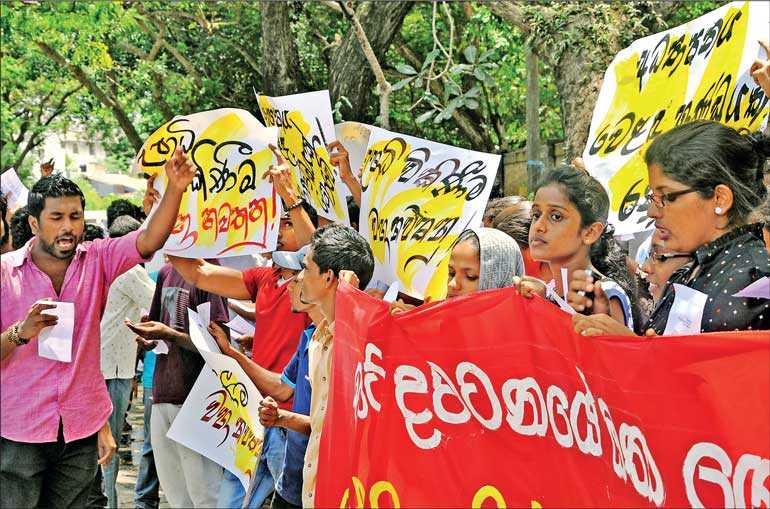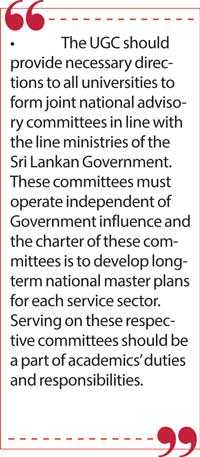Thursday Feb 19, 2026
Thursday Feb 19, 2026
Wednesday, 6 March 2019 00:00 - - {{hitsCtrl.values.hits}}

“Who can save Sri Lanka?” This was the caption of an article published in a mainstream newspaper a few months ago. The author, T.M. Premawardana, presented numerous historical examples to highlight how the Sri Lankan public saved this country at desperate times taking defiant actions. 
To quench my thirst, I read three brilliant articles published on Daily FT, written by veteran good governance advocate, Victor Ivan on bribery and corruption. As a remedy to curb the bribery and corruption menace, he proposed significant structural changes to the Constitution of Sri Lanka.
Ivan emphasised that heads of State would never initiate this much-needed change as it would affect their own corrupt livelihood. In addition, he mentioned that the general public may not have the necessary technical knowledge and experience to participate in the constitutional change process. I agree with both his assertions. If I add my views on this, the Opposition political party members would not support this change either as it would impact them later in their political careers.
I would love to witness the public play a significant role to regain our long lost innocence and glory every time the country is in trouble, however I am not prepared to bet on this as the tolerance level of any human being has a fatal limit.
Guiding the nation’s destiny
The future of a nation depends on the national policies of governance and societal values the nation embraces. Hence, who could guide and eventually save us? It depends on who has the technical knowledge and experience, the willingness to initiate change and is of untarnished character to be looked up to. Does that kind of person exist in this island?
Let’s look at the professionals in the public sector. A recent news item claimed that 25% of public sector employees in Sri Lanka are corrupt to the core. The rest is perceived as passive observers. If this is the situation, there is no hope that they would guide the nation to prosperity. By the way, I worked in the public sector. My first-hand experience suggests to me that they too are entangled intrinsically in the corrupted bureaucratic web, with or against their will, and they have no genuine impetus for playing the role of ‘change agents’. 
Inevitably, one has to find a group having the least vulnerability to become the pawns of egocentric elements. Let’s accept the reality. You cannot find saints in this paradise. My best bet would be the academics in the Sri Lankan higher education sector. Before anyone raises eyebrows by naming a few biased academics, I have to put forward a few qualifications and pre-requisites to support my statement.
To make my suggestion fruitful, there should be a radical change in how the academics in the university system operate and how the undergraduate and post-graduate degree programs are conducted.
Radical changes to the higher education sector
Universities are our national think-tanks. However, these entities do not operate as think-tanks but perform only as factories which mass-produce graduates using a standard block. The production block is cast with theoretically rigid materials.
Recently I met a CEO of a leading construction firm in Sri Lanka. He lamented about the low confidence level of the new graduates and also highlighted poor presentation skills. According to my close associations with other renowned professionals in Sri Lanka, this is a situation prevailing across the board. The employees are struggling to find practically competent graduates who have critical analytical skills.
Sri Lankan universities have produced thousands of graduates for more than a century. How many of them became real leaders for the nation, to navigate Sri Lanka through the volatile economic sea? Almost none. This is why Sri Lanka is still a developing country. Have we at least become an educated and discipline nation? If we were of that quality, we would not have appointed the current crop of politicians.
Ideally, the degree holders who come out from this education system must be ready with both theoretical knowledge and practical skills to become the ‘change agents’ when they are employed in both the private and public sector. They should influence and advice the politicians on how to govern the country and also educate the public on what is right for the country. It doesn’t happen.
Hence, the higher education system needs a complete overhaul. By examining the quality of the undergraduates, it is obvious that many of degree course study materials are not ‘outcome based’. It is sad to see that the undergraduates still compete with each other with limited library resources, despite being outdated, like I myself did 35 years ago.
Some of my university friends who became eminent professors highlight how the outdated equipment in laboratories prevents them from introducing testing methods specified in the international standards and the codes of practice.
Sri Lankan academics cannot hide anymore under the good old hard theoretical umbrella producing robots as all the public and private affairs are now subjected to global scrutiny and compliance. It is not a surprise that Sri Lankan universities are not listed even within the top 500 in Asia. It is better not to talk about the world rankings.
However, this is not due to anything wrong with the students entering the universities but the higher education system that has been thrust upon them. The University Grant Commission and the academics should initiate the necessary transformations.
At the outset of this effort, the degree courses in national universities must be made relevant to the national needs of the next 10 years. Hence, a demand analysis must be done to identify the long-term professional resources needs. There shouldn’t be an unemployment crisis for undergraduates. Also, they should not be underemployed or underpaid.
The students should have a better understanding from the enrolment day of their degree courses where they are destined and in which organisations probably they will serve. Also, the number of graduates produced for each education stream should be decided in line with demand. If one service sector has more demand, then the resources should be redirected accordingly.
The syllabuses and the course contents must be outcome based. In developed countries, outcome-based education systems have been practised for many decades. This means that after completing each course module, the students should be able to use the knowledge and perform a certain pre-identified activities and tasks, not just be theoretical gurus.
All the university courses must be transformed into professional study courses by incorporating a research and analysis component. This means that each and every graduate should do a research on a selected topic of contemporary importance and submit a report as a partial fulfilment of the degree award. The academic staff should select the research topics of national interest for the undergraduates.
There should be a professional link between the universities and the industry and service sector and the Government should channel the national challenges to the universities to find solutions. Not only should research and analysis be done at a relatively high level in line with international research guidelines, the findings must be presented by the student to a fraternity of professionals for necessary feedback.
This would also give the undergraduates the confidence on getting the facts right, public speaking and presentation skills based on the targeted audience and also on sound responses to the queries without getting too emotional and personal. The soft copies of the final research reports must be available for the public to update their knowledge on national issues.
The other important element of education is the interaction of undergraduates with real-world scenarios during their learning phase. Ideally, there should be a monthly public lecture at the university, delivered by a reputed industry practitioner and the attendance to these lectures must be made compulsory for all undergraduates.  This way the undergraduates could understand the practical problems and the current trends in the industry. This allows them to concentrate on enhancing peripheral knowledge by further reading and networking.
This way the undergraduates could understand the practical problems and the current trends in the industry. This allows them to concentrate on enhancing peripheral knowledge by further reading and networking.
Each student should be encouraged to have a mentor from the industry. These public speakers could be drawn from different professions to emphasise the fact that the graduates cannot operate in isolation, in a particular field of practice, as they will be a part of a larger integrated system.
The country needs graduates who have well-rounded knowledge and skills and also who have the appreciation mindset on collaborative team work. Only after this kind of transformation can we expect to see the graduates of high stature who fit into the national governance system.
National Advisory Committees
Sri Lanka has 15 recognised State universities established under the authority of the University Grants Commission (UGC) with University Status under the Universities Act No. 16 – 1978. In addition, there are a few universities established under Acts of Parliament which are not recognised under the Universities Act No. 16 – 1978.
Successive governments have approved a series of private colleges and specialist institutes as degree-awarding bodies. I consider all above educational bodies as being part of higher education in Sri Lanka. I have no intention to delve into a debate on the pros and cons of current private educational institution set-up. My main aim is to express my views on the qualitative nature of the program outcomes from these entities.
All universities have a range of faculties. These faculties have eminent scholars who possess doctoral degrees and accreditations from professional bodies. The majority have obtained their formal qualifications from recognised universities local and abroad. Some have even gained in-depth experience by serving in the various industries and in global bodies like the United Nations. Basically, they have a wealth of knowledge. However, their service is currently confined to mere teaching component. Their involvement in national policy making only happens on an ‘as request’ basis. This has to be changed.
The UGC should provide necessary directions to all universities to form joint national advisory committees in line with the line ministries of the Sri Lankan Government. These committees must operate independent of Government influence and the charter of these committees is to develop long-term national master plans for each service sector. Serving on these respective committees should be a part of academics’ duties and responsibilities.
Predominantly, the national advisory committees are only to be answerable to UGC and in this area of responsibility, the UGC must be accountable to the public, not to the elected government.
Just as an example, the Economic Sector Advisory Committee could consist of eminent professors and senior lecturers in the Business and Economic Management faculties of State and private sector universities.
To add the element of practical viability of the affairs, Sri Lankan business leaders should be invited to serve the committee at a nominal fee or voluntarily as non-permanent members. Even international resources could be tapped by inviting Sri Lankan academics in the foreign universities to participate in the brainstorming sessions remotely via teleconferencing. This committee must have the authority to obtain services of any other professionals in the economic management sector. This is the process that should be repeated for all service sectors.
The way forward
Let these advisory committees study the national gaps and needs, how other successful countries go about bridging the gaps to fulfil the needs and then develop a national strategic master plan for each service sector.
One such committee could be the committee to develop a model constitution for Sri Lanka incorporating internationally acceptable good governance elements on behalf of whole nation, without being biased to any political agendas. All the master plans and other outcomes such as the proposed constitution must be finalised and presented to the public as the best practice conceptual plans. Then, the ball will be in the court of the political parties.
Any political party which seeks public vote to govern the country must solemnly promise the public that they would make these plans realities. If they made these promises in writing at the time of a national election, these are legally-bound promises. If the elected fail to deliver the promises, then the public or the advisory committees could seek legal intervention on behalf of the entire nation. Are we as a nation fortunate enough to see this dream come true during our lifetime?
(Eng. Janaka Seneviratne is a Chartered Professional Engineer, a Fellow and an International Professional Engineer of both the Institution of Engineers, Sri Lanka and Australia. He holds two Masters Degrees in Local Government Engineering and in Engineering Management and at present, works for the Australian NSW Local Government Sector. He is contactable via [email protected].)